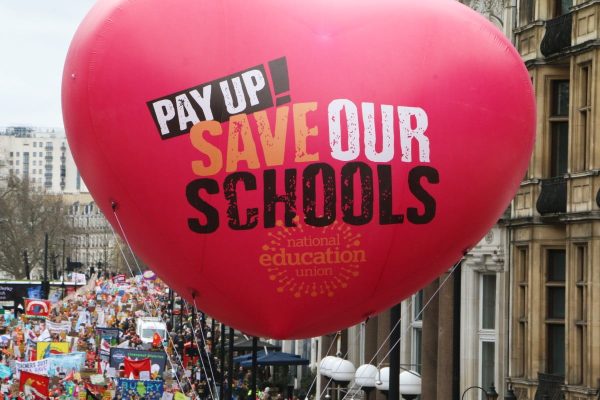Today, after months of strike action, the NEU voted to accept the government’s deal of a below-inflation 6.5% pay increase.
Despite a sizable minority campaigning to reject the deal, the leadership were able to put enough pressure on members to convince 86% to vote in favour, on a 60% turnout.
Teachers have seen a 20% fall of real wages since 2010. But this is just one of a number of issues plaguing schools. Teachers had been pushed into struggle by the ‘polycrisis’ facing education.
Funding has been slashed. Academisation is rampant. Workloads have rapidly increased. And there are big question marks over Ofsted.
All of this has meant death by a thousand cuts for staff and students. And the current deal solves precisely none of these issues.
Momentum
 Prior to this, momentum behind the strike had been building. After strike action was first called, thousands of teachers and support staff joined the NEU. More and more unions were joining the fray. Determination amongst members was hardening.
Prior to this, momentum behind the strike had been building. After strike action was first called, thousands of teachers and support staff joined the NEU. More and more unions were joining the fray. Determination amongst members was hardening.
But then the Tories made an improved – but still sub-inflation – offer to public sector workers, in a bid to quell Britain’s strike wave.
And scandalously, education union leaders even put out a joint statement with the Tory government in recommendation of the deal.
This was clearly revealed in today’s results, which also showed the outcome of the strike reballot that began in May. In this, 95% of members voted Yes on a 53% turnout.
In other words, the union had a huge mandate for continued action. But having accepted the government’s deal, the leadership cannot do anything with this.
Any momentum has therefore been completely cut across. Many teachers are set to be worse off in September than they were last year.
This has left many teachers asking: why have union leaders squandered this opportunity?
Fundamentally, the NEU leadership doesn’t believe that teachers are willing to continue the fight. Furthermore, they think that if they do strike, the union will be alone and isolated. And finally, they feel that no further progress will be made through strike action under this government, and that it is better to wait until Starmer is in Downing Street.
But do these arguments hold up?
Isolation
 It is true that summer strike action saw reduced numbers on the picket lines. But this was more down to a lack of militant strategy from the top, not a lack of determination from below.
It is true that summer strike action saw reduced numbers on the picket lines. But this was more down to a lack of militant strategy from the top, not a lack of determination from below.
Many members saw the two strike days at the end of the summer term as lacking any real bite. They were not convinced that the Tories would be moved by sporadic action.
Without serious, hard-hitting action, the only real impact of these walkouts was on workers’ own pay packets and the students themselves.
When comrades have raised the idea of coordinated, escalated, and sustained action, however, this has received widespread support amongst members – especially when linked to the goal of removing the Tories from power.
And there was clear potential for coordination action – both in schools, and with other sectors.
At the time that the Tories presented their latest offer, the ASCLL and NAHT headteachers’ unions were balloting members over strike action. And NASUWT members had just returned a strong vote in favour of walkouts. There was therefore a real possibility of joint picket lines outside of schools in September.
Similarly, junior doctors and other health workers in the BMA have been continuing their struggles. And RMT rail workers are battling on in their long-running dispute with the train-operating companies.
Clearly, then, had the NEU leaders defied the government and forged ahead with further action, members would not have been stranded alone.
Labour
 Finally, the idea that the Tories will budge no further, and that we must instead wait for Starmer to save the day, is flawed.
Finally, the idea that the Tories will budge no further, and that we must instead wait for Starmer to save the day, is flawed.
This perspective flows from the claim – put forward by NEU leaders – that austerity is simply a political choice. But austerity is not a ‘choice’. It is the logic of capitalism, which demands that the working class pays for the crisis.
We must have no illusions about what lies ahead under a future Starmer government. In a statement on the party’s education policy, the Labour leader euphemistically said that he had “a full understanding that significant change requires significant investment”.
In other words, there will be no break from the status quo under a Labour government.
Labour will inherit a deep crisis of capitalism from the Tories, with no money for ‘significant investment’. No matter what policies they dream up today, Starmer and co. will be forced to make ‘tough decisions’ tomorrow. This means further attacks on education, on teachers, and on the whole working class.
To suggest that ‘Sir’ Starmer is more amenable to our concerns, as the NEU leaders do, is dangerous – disarming education workers for the necessary battles to come.
Tactics
 An unwillingness to fight. A lack of faith in the membership. A desire to take the path of least resistance, and to compromise and accept peace on the enemy’s terms. Sowing illusions in Starmer – the establishment’s knight in shining armour. All of this comes from the so-called ‘left’ leadership that heads up the NEU.
An unwillingness to fight. A lack of faith in the membership. A desire to take the path of least resistance, and to compromise and accept peace on the enemy’s terms. Sowing illusions in Starmer – the establishment’s knight in shining armour. All of this comes from the so-called ‘left’ leadership that heads up the NEU.
These leaders might style themselves as militants. Yet they have been the most determined when it comes to convincing members to accept a rotten deal.
The broad left within the union, NEU Left, also failed to take a position on the government’s deal. They said that it was only a ‘tactical question’ of whether to accept or reject.
This may be true. A good general must not simply announce ‘charge!’ at every moment. But they must also be able to recognise when their army has the high ground; when there is the potential to advance.
And with momentum building, sister unions coming out, and unambiguous support for further struggle amongst members, as the strike reballot shows, why call a retreat now?
Like the grand old Duke of York, having marched the troops to the top of the hill, the union leaders have marched them back down again. This is a recipe for exhaustion and demoralisation.
Leadership
 The NEU leaders will point to the fact that other public sector unions are also wrapping up or pausing their disputes as evidence that they were right to accept the government’s deal. And no doubt the leaders of these other unions will do the same. They are all looking for an excuse to call a truce, and to restore calm on the industrial front.
The NEU leaders will point to the fact that other public sector unions are also wrapping up or pausing their disputes as evidence that they were right to accept the government’s deal. And no doubt the leaders of these other unions will do the same. They are all looking for an excuse to call a truce, and to restore calm on the industrial front.
Instead, however, if the union leaders had all organised together to bring workers out as one, calling for mass coordinated action to topple the Tories, then we could be in a completely different situation right now.
This shows the difference that leadership makes. Above all, it demonstrates the need for fighting leadership – in the NEU and across the trade union movement.
It is vital that rank-and-file activists learn the lessons from this episode. Even a ‘left’ leadership will buckle, if they limit themselves to demanding crumbs within capitalism, rather uniting workers in a struggle against this bankrupt system.
What is needed is a militant leadership, composed of class fighters who are willing to take the fight to the end.
This is what Socialist Appeal comrades – the Marxists in the NEU and the labour movement – are attempting to build. We call on revolutionary teachers to join us in this task.






